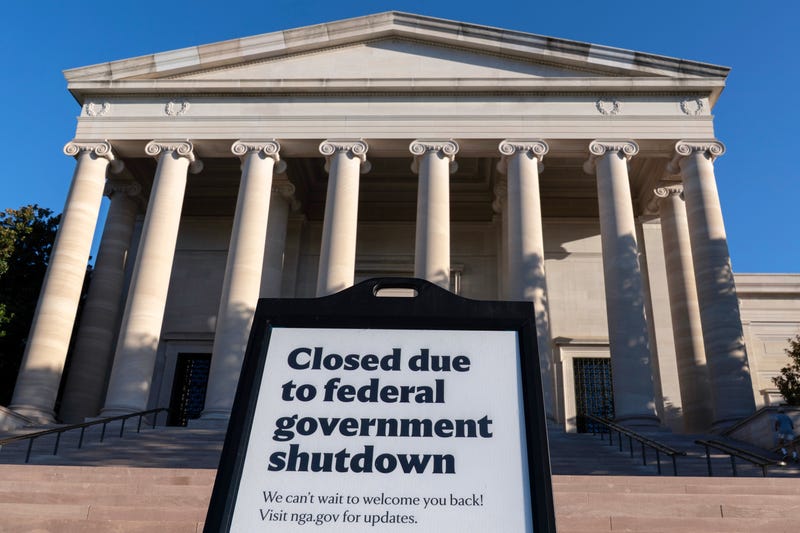
WASHINGTON (AP) — Jessica Sweet spent the federal government shutdown cutting back. To make ends meet, the Social Security claims specialist drank only one coffee a day, skipped meals, cut down on groceries and deferred paying some household bills. She racked up spending on her credit card buying gas to get to work.
With the longest shutdown ever coming to a close, Sweet and hundreds of thousands of other federal workers who missed paychecks will soon get some relief. But many are left feeling that their livelihoods served as political pawns in the fight between recalcitrant lawmakers in Washington and are asking themselves whether the battle was worth their sacrifices.
“It’s very frustrating to go through something like this,” said Sweet, who is a union steward of AFGE Local 3343 in New York. “It shakes the foundation of trust that we all place in our agencies and in the federal government to do the right thing.”
The shutdown began on Oct. 1 after Democrats rejected a short-term funding fix and demanded that the bill include an extension of federal subsidies for health insurance under the Affordable Care Act. Its end emerged when eight Democratic-aligned senators agreed to a deal to fund the government with no extension of the expiring subsidies.
Federal workers deeply felt the impacts of the shutdown
The shutdown created a cascade of troubles for many Americans. Throughout the shutdown, at least 670,000 federal employees were furloughed, while about 730,000 others were working without pay, according to the Bipartisan Policy Center.
The plight of the federal workers was among several pressure points, along with flight disruptions and cuts to food aid, that in the end ratcheted up the pressure on lawmakers to come to an agreement to fund the government.
Throughout the six-week shutdown, officials in President Donald Trump's administration repeatedly used the federal workers as leverage to try to push Democrats to relent on their health care demands. The Republican president signaled that workers going unpaid wouldn't get back pay. He threatened and then followed through on firings in a federal workforce already reeling from layoffs earlier this year. A court then blocked the shutdown firings, adding to the uncertainty.
The deal that is bringing an end to the shutdown will reverse the dismissals that occurred since Oct. 1, while also ensuring back pay for furloughed federal workers the Trump administration had left in doubt. The bipartisan deal provides funding to reopen the government, including for SNAP food aid and other programs.
Frustration over the shutdown and how it was brought to an end
But the whiplash of the past six weeks, coupled with the concern that the longest shutdown ever may not be the last they face, has shaken many in the workforce.
“Stress and hunger are great tactics for traumatizing people,” Sweet said.
For Sweet, the feelings of frustration are only compounded by a feeling that she was betrayed by the Democratic-aligned senators who broke with the party on the health care subsidies.
She said that she understands that many workers were desperate for a paycheck. But she thought standing firm on the issue of the health care subsidies was worth her sacrifice.
"There are other federal workers who understood what we were holding the line for and are extremely unhappy that line was crossed and that trust was breached,” she said.
Ready to get back to work
Adam Pelletier, a National Labor Relations Board field examiner who was furloughed Oct. 1, said he is glad the compromise includes rehiring laid-off workers, but “the agreement that was reached almost feels like the Charlie Brown cartoon where Lucy holds the football and pulls it out from them.”
Pelletier, a union leader for NLRBU local 3, had financially prepared for the shutdown back in March when it became clear that a funding agreement between Democrats and Republicans likely would not be reached. He says the shutdown has made him feel “like a pawn" because federal workers had no say over their own fate.
The federal workers who spoke to The Associated Press had one common message: that they were reeling but ready to get back to work.
“This has been the worst time in my 20 years to be a federal employee,” said Elizabeth McPeak, a furloughed IRS employee in Pittsburgh who is National Treasury Employees Union Chapter 34 first vice president. She said colleagues had to beg their landlords to hold off on collecting rent payments and relied on food banks during the shutdown.
“A month without pay," McPeak said, “is a long time to go.”
___
Follow the AP's coverage of the federal government shutdown at https://apnews.com/hub/government-shutdown.